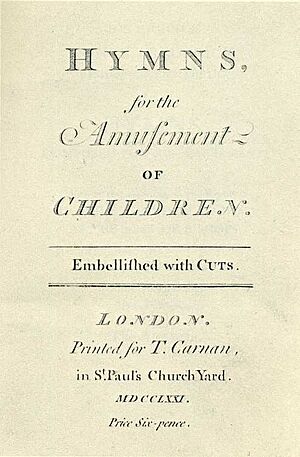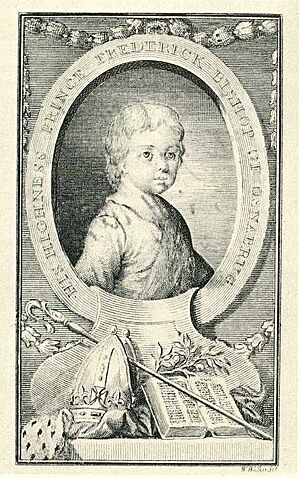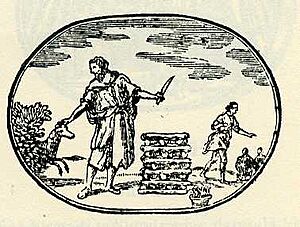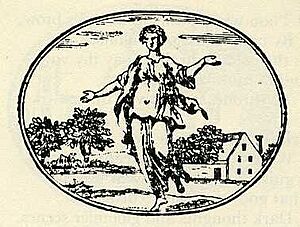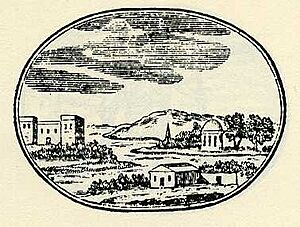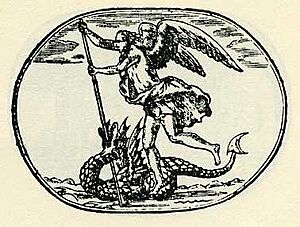Hymns for the Amusement of Children facts for kids
Hymns for the Amusement of Children (1771) is a special book of poems by the English writer Christopher Smart. It was the last book he finished before he died. Smart wrote these poems while he was in prison because he owed money.
This book was one of the first collections of hymns written just for kids. Its main goal was to teach children good Christian values. Unlike some of Smart's other books, this one became very popular right away. Many copies were printed soon after it came out. People liked it because it was simple and easy to understand. Sadly, Christopher Smart died before he knew how successful his book was.
Contents
About the Book's Creation
Christopher Smart had a tough life. After being in a mental health hospital, he published some religious books. But critics didn't like them, and they weren't popular. Smart kept writing religious works, but he struggled to make enough money.
In 1770, he was arrested for debt and sent to a Debtors' prison. Even in prison, people tried to help him. A friend named Charles Burney paid for Smart to have a little more freedom during his last weeks. Smart wrote a letter asking for a small amount of money for food. He died soon after, in May 1771, after finishing Hymns, for the Amusement of Children.
Writing in Prison
We don't know exactly how many poems in Hymns were written before Smart went to prison or during his last days there. But we know at least one poem, "Against Despair," was worked on while he was imprisoned. Another version of this poem was published after he died. It said the poem was written "Extempore by the late C. Smart, in the King's-Bench." This shows he was still writing or editing his hymns during that difficult time.
How the Book Was Published
Five different versions of Hymns were printed in the 1700s. Only one of these was published before Smart died. His brother-in-law, Thomas Carnan, published it in late 1770. However, this first edition did not say Christopher Smart was the author.
The book became quite popular and even reached places like Boston, Massachusetts. There was an advertisement for it there in 1795. It also had an edition published in Philadelphia, Pennsylvania.
Inspiration for the Hymns
Smart had written a children's hymn before, in 1751. When he wrote Hymns for the Amusement of Children, he looked at the works of two other famous hymn writers: Isaac Watts and Charles Wesley. Watts tried to make his hymns fun for children. Wesley tried to make Christian ideas simpler for them.
Smart's Hymns might have been inspired by a note in Watts's book, Divine Songs. Watts suggested that someone should write "Moral Songs" for children. He thought these songs should be cheerful and easy to understand. They should teach good lessons from nature and everyday life, without being too serious or using too many religious words. This way, children could "find delight and profit together."
Dedicated to a Prince
The book was dedicated to Prince Frederick, who was the second son of King George III. The prince was only seven years old at the time. Smart got special permission to dedicate his book to the young prince. This was likely arranged by someone close to the royal family.
What the Hymns Teach
The Hymns for the Amusement of Children teaches kids about important good qualities, called virtues. Smart wanted to show the joy of God's creation and the importance of Christ's sacrifice. He also wanted to teach valuable lessons about how to live a good life.
The poems start with three main Christian virtues: Faith, Hope, and Charity. Then they cover four other important virtues: Prudence, Justice, Temperance, and Fortitude. Smart also added Mercy. The next poems talk about Christian duties. After that, there are ten hymns about the Gospels. The last poems teach other Christian virtues. Smart said his goal was to "make good girls and boys."
Most of the hymns had a small picture, called a woodcut, with them. These pictures showed what the hymn was about or had a symbolic meaning. In later versions of the book, sometimes the pictures didn't match the hymns. This was because the quality of book printing sometimes got worse.
There are thirty-nine hymns in Hymns for the Amusement of Children:
|
|
|
Hymn XXV: Mirth
Besides the usual hymns, this collection also includes poems about learning and being kind to animals. Hymn XXV, called "Mirth," is a good example. It shows Smart's love for flowers, which often appeared in his poems. Here's part of it:
- If you are merry sing away,
- And touch the organs sweet;
- This is the Lord's triumphant day,
- Ye children in the gall'ries gay,
- Shout from each goodly seat.
- It shall be May to-morrow's morn,
- A field then let us run,
- And deck us in the blooming thorn,
- Soon as the cock begins to warn,
- And long before the sun.
- I give the praise to Christ alone,
- My pinks already shew;
- And my streak'd roses fully blown,
- The sweetness of the Lord make known,
- And to his glory grow.
This poem shows the simple and natural style of the whole collection.
Hymn XXIX: Long-Suffering of God
Hymn XXIX, "Long-Suffering of God," is one of the more touching poems in the book. It talks about Smart's strong belief that God will eventually show kindness to everyone, even when people don't do good things. Here are some lines:
- Thus man goes on from year to year,
- And bears no fruit at all;
- But gracious God, still unsevere,
- Bids show'rs of blessing fall.
- The beams of mercy, dews of grace,
- Our Saviour still supplies-
- Ha! ha! the soul regains her place,
- And sweetens all the skies.
This poem ends with a feeling of great joy. It shows that for Smart, thinking about God's kindness and mercy was very important.
Hymn XXXIX: The Conclusion of the Matter
The very last poem in the book, "The Conclusion of the Matter," shows that Christopher Smart's joy and hope never faded. He didn't look back at his troubles. Instead, he looked forward, and the book ends on a very positive note.
Even though Smart himself didn't gain much success in his lifetime, people believed he found peace after he died.


